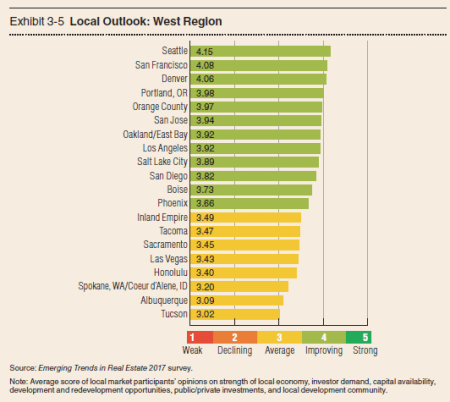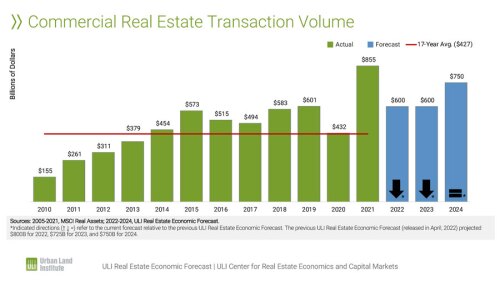Now in its 38th year, Emerging Trends in Real Estate® is one of the most highly regarded annual industry outlooks for the real estate and land use industry. It draws from interviews with and survey responses from more than 2,000 leading real estate experts, including investors, fund managers, developers, property companies, lenders, brokers, advisers, and consultants.
The “Markets to Watch” section of the 2017 edition of Emerging Trends offers an expanded look at all 78 markets included in this year’s survey. Key to this expansion was the ULI district councils’ convening of 30 focus groups, during which market experts contributed their knowledge and insights. This expertise is also referenced throughout the rest of the report.
Register for the Upcoming Real Estate Consensus Forecast | Register for the ULI Spring Meeting in Seattle
Here is the industry outlook for the primary markets in the U.S. Pacific Northwest:
Portland: Oregon’s largest city is projected to continue to enjoy the strong economic and demographic growth that has propelled the market to the upper levels of the Emerging Trends survey. New residents continue to be drawn to the market for the high quality of life, while employers enjoy tapping into comparatively lower business costs and a well-educated labor force. Professional, technical, and business services have been the backbone of the Portland economic recovery since 2011, with growth in these sectors easily outpacing that seen at the national level. These jobs not only have been important to attracting new residents to the market, but also have helped push up incomes in the metro area due to the higher wages they pay. The pace of tech growth may slow due to a tightening labor market, but the pace of growth is expected to remain above the national average. The combination of rising population and incomes has been particularly beneficial to consumer services, retail, and the housing market. Portland home price appreciation has been leading the nation, and builders are having a difficult time keeping up with current demand. Despite rising prices for single-family homes, rent is still relatively affordable in Portland. The market should have little problem absorbing the current number of units currently under construction.
Seattle: The fundamentals for the success of the Seattle market appear well established for another year. While the more traditional manufacturing sector may see some slowdown due to cuts in aerospace production, technology-related sectors of the economy are still growing rapidly.
The Seattle technology industry is dominated by information technology firms focused on cloud computing and those focused on internet retailing. Tech hiring in Seattle has been so competitive that the average hourly pay rate for an IT worker is now $10 higher than the national average. The outlook for tech hiring remains strong as firms continue to locate to the market to take advantage of the proximity to industry leaders. This is evidenced by the increase in venture capital flows to the market over the past 12 months.
Seattle has lowered its dependence on the aerospace industry from historical levels, but current cuts will still have an impact on the market. The job losses, along with the eventual loss of income, will be a negative to future economic activity.
Population growth in Seattle is projected to remain at nearly twice the national rate. This pace is impressive given the current size of the Seattle metro area, at around 3 million residents. The combination of strong job growth and rising incomes is projected to push household formation up in 2017, which will increase demand for both single- and multifamily housing. The multifamily market will need the higher level of demand since the market will add 5 percent to its existing inventory.
Spokane, Washington/Coeur d’Alene, Idaho: The Inland Northwest region, composed of the Spokane, Washington, and Coeur d’Alene, Idaho, metro areas, has a relatively diverse economic base. The Spokane economy is more industrial oriented while Coeur d’Alene’s is more consumer focused. Growth in the Spokane market will be challenged by cutbacks in the aerospace manufacturing sector due to production cuts planned in the industry. Spokane is a regional center for health care, financial services, and education. Expected growth in these sectors could help offset the economic losses due to lower manufacturing output. Consumer spending growth due to rising regional incomes is providing support to consumer industries in Coeur d’Alene. Population growth in the market, particularly residents over the age of 65, is increasing demand for health care services jobs. These types of jobs in Coeur d’Alene tend to be in the mid- and high-wage category.
Tacoma: The Tacoma, Washington, market will rely more on services employment in 2017, while growth may be slower in the trade and transportation industries. The level of activity at the Port of Tacoma is expected to slow in the near term, with less traffic from China and other emerging economies. The port is, however, investing in the infrastructure needed to handle larger vessels that will be able to move through the widened Panama Canal. Over the longer term, this investment should allow the port to hold its market share of trans-Pacific trade. Financial services employment is expected to grow in 2017. Tacoma is seeing some benefit as employers view the market as a lower-cost alternative to Seattle. Employers can take advantage of the lower real estate and labor costs while still serving Greater Seattle and the Pacific Northwest region.





